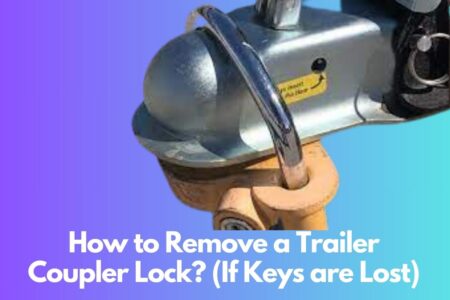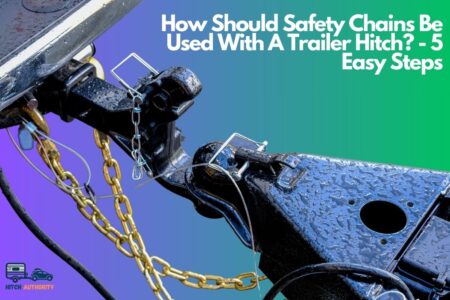A trailer hitch that refuses to disengage from the ball can be incredibly frustrating. The platform just continues bouncing on the hitch instead of uncoupling. What causes this issue and how can you get the hitch to properly release again?
This guide covers the most common reasons trailer hitches fail to open and tips to get them uncoupled:
Common Causes of Trailer Hitches Not Releasing
There are several typical causes of stubborn trailer hitches that won’t open and uncouple from the tow vehicle:
- Rust or corrosion – This can fuse or freeze the locking mechanism and moving parts preventing them from releasing as intended. Time, moisture, and lack of lubrication allows rust to take hold.
- Damaged, worn, or warped parts – Items like the locking latch, handles, pins, and springs can bend or degrade over time from use which affects proper function. Corrosion accelerates wear.
- Debris or grit buildup – Road grime, dirt, sand, and grit entering the working parts of the hitch receiver can jam the release function or hinder smooth motion.
- High loads or loads shifted backward – Too much tongue weight pressing down on the hitch ball can bind parts together. Cargo shifted rearward in the trailer has the same effect.
- Misalignment – If the trailer weight is not evenly distributed or supported properly, it can twist the system and prevent the release of the locking mechanism.
- Excess friction – Grease and lubricant wears off over time. Unlubricated metal parts dragging against each can lead to difficult operation.
- Design flaws – Some hitch models unfortunately have subpar designs more prone to jamming or seizing up unexpectedly.
- Damage during use – A hard impact on the hitch such as if the trailer gets backed into an object or dropped off the ball while loading can also distort or misalign parts.
In most cases, some combination of wearing parts, friction, corrosion, and debris are the culprits of a stubborn hitch in need of a deep clean and lubrication at minimum. But significant damage may require repairs or replacement.
Force Releasing Seized Trailer Coupler Locks
For hitches fused into place, try freeing up the mechanism:
- Spray penetrating lubricant like WD-40 into the internal sections and work the handle to loosen.
- Use a rubber mallet to tap the hitch body near moving parts to jar debris loose.
- Insert a screwdriver or punch into latch holes to manually push the lock open.
- Rock the trailer tonguejack to shift trailer load off the hitch ball and provide wiggle room.
- Use a pry bar on trailer frame members near the hitch to flex the system.
- As a last resort, remove bolts to separate the hitch if no other options.
Avoid damaging lugs or flanges that position the hitch. Work patiently yet firmly to free up stuck parts. But if no progress is made, further disassembly or repairs may be needed.
How to Clean and Lubricate Trailer Hitch Parts
Thorough cleaning and lubrication helps prevent the issue in the first place:
1. Remove debris – Use a wire brush, knife, and/or pressurized air to remove packed in dirt, grime, salt, and road debris from external and internal surfaces.
2. Degrease – Spray down components with solvent cleaner to break down oily gunk and prepare surfaces.
3. Rinse – Blast all parts with water jets to flush out loosened contaminants and cleaning agents.
4. Dry – Allow all components to fully air dry to prevent trapping moisture that can lead to premature rust.
5. Lubricate – Use spray white lithium grease on pivot pins, locks, springs, bearing surfaces. Silicone-based lubricants prevent grime from re-sticking.
6. Reassemble – Carefully reinstall all moving parts, inspecting for damage and replacing worn pieces as needed.
7. Test operation – Fully work the handle and locking mechanism several times to confirm smooth motion. Add more lubricant to sticky spots.
Regular cleaning and lubrication helps prevent seizing, rust, and wear so hitches operate reliably for years.
When to Call a Professional for Trailer Hitch Repair
If significant rusting, damage, or failure has occurred internally, you likely need a professional hitch repair service for fixes like:
- Torching off fused hitch parts and replacing damaged components
- Reworking distorted mounting holes or frames preventing alignment
- Replacing severely worn or inadequate hitch equipment with heavy duty models
- Repairing/replacing rusted or broken exterior housing pieces
- Complete teardown, cleaning and lubrication of badly neglected hitches
- Electrical repairs to connectivity pins, wires, and lights
Don’t hesitate to call a professional mobile mechanic or trailer repair service for an expert evaluation and fixes if you lack the tools, parts, or knowledge for major hitch repairs. Their expertise can quickly get your trailer reconnectable and back on the road.
Keeping your hitch properly maintained plus inspecting and addressing any damage immediately helps avoid the headache of stubborn stuck hitches that refuse to open. But with some elbow grease and mechanical skill, even badly seized hitches can typically be repaired and restored to smooth operation. Just take all necessary safety precautions if force is required during the freeing process.


